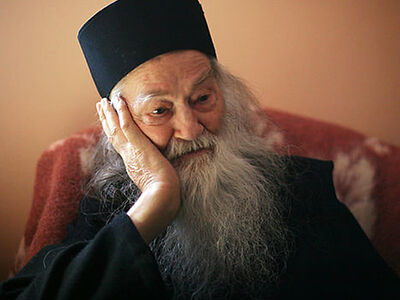 A sketch for the painting, At the Doctor’s. Artist: Marina Ivanova
A sketch for the painting, At the Doctor’s. Artist: Marina Ivanova  About HumilityThus, we should learn humility not from angels, not from men, not from the great books of the Gospel, but from Christ Himself, for He calls us to this.
About HumilityThus, we should learn humility not from angels, not from men, not from the great books of the Gospel, but from Christ Himself, for He calls us to this.
“>Humility is one of the most important Christian virtues. When I was just coming to the faith and integrating into church life, it seemed to me that this quality came from weakness, from an unwillingness or inability to fight, resist, and respond to injustice.
And only a few stories from real life made me understand with my heart and accept that strength is in humility, in the ability to accept the  How to know the will of God?In the course of our lives, we are often faced with the choice of how to proceed, which path to walk down, and not just to walk down, but how to know that this path corresponds to God’s will for us. And how can we know the will of God? How do we know that we’re making the right choice? Several pastors of the Russian Church offer their advice.
How to know the will of God?In the course of our lives, we are often faced with the choice of how to proceed, which path to walk down, and not just to walk down, but how to know that this path corresponds to God’s will for us. And how can we know the will of God? How do we know that we’re making the right choice? Several pastors of the Russian Church offer their advice.
“>will of God and in faith in the Lord’s mercy.
During my student years I lived in the main campus of Moscow State University on Vorobyovy Gory in Moscow. Nino, a postgraduate student from Georgia, lived in the next room. She was kind and even-tempered, but something in her irritated me: She seemed too “ideal” and calm to me, I wanted to make fun of her or even hurt her. Nino’s relatives often came to visit her, and after dinner they would sing beautiful Georgian songs together. My friends and I would start shouting them down and parodying them loudly for our amusement. Our neighbors would get embarrassed and stop singing. We were confident in our “omnipotence”, that we could easily and quickly silence others and spoil their good mood. One day Nino caught up with me when I was returning from my morning jog and handed me a bag of huge, juicy apples. She said:
“You study and work hard. I saw you on TV at a press conference. Please take them—these are living vitamins…”
I felt ashamed. I played jokes on her, murdered those touching Georgian songs, and considered it an “achievement”, while this woman was treating me to apples instead of berating me, rebuking me, taking offence, and no longer speaking to me. I stopped at of the front door, fiddling about with the bag. I wanted to apologize, struggling to find appropriate words, but Nino left quickly. Of course, we did not interfere with our neighbor’s singing anymore.
I recall my grandmother Praskovya Prokofievna. For me she was a model of faith, kindness, humility and love for people. She would have done the same if she had been in Nino’s place; she would have been driven by love, not malice. Her ability to forgive everyone, humble herself and believe in the mercy of the Lord was amazing. One day my mother’s wallet with all her pay was stolen in a store. My mother and I went home empty-handed and burst into tears of desperation over the injustice, and only my grandmother comforted us, saying:
“The Lord will not forsake us. Someone needed this money more than we did. Maybe a child whose mother is sick has stolen it. And it’s pointless to go to the police anyway—you can’t even describe the pickpocket.”
We tried to argue with her, saying terrible words about the thief and wishing cruel punishment upon him. My grandma stopped us, “Never wish ill upon anyone or curse anyone.” Her favorite argument was the following:
“When the Lord was crucified, the people He had helped mocked Him, saying, ‘Save Thyself.’ But did the Lord get angry or curse them? Anger does not look good on your young and beautiful faces…”
My mother and I began to complain that we would be left without lunch for the next few days, because we were wanting to cook beef borscht for a week in advance, we stood in line to buy some beef, it had been weighed for us, but the wallet disappeared from the bag… Grandma just smiled: “We won’t starve.”
In the evening, a former patient of my grandmother’s came to us unexpectedly. Praskovya Prokofievna used to work as an obstetrician in Baku for many years. Our unexpected guest had a complicated birth more than twenty years before, as a result of which a healthy four-kilogram boy was born. The woman arrived from Azerbaijan with her husband and adult son. After serving in the army, her son was going to get married, and his parents found our address in Moscow, wishing to thank my grandmother for her conscientious work and for treating her patients with love. Large baskets full of fruits, ripe tomatoes, ready-made dolma, and various oriental desserts were brought to our apartment in several batches. A splendid natural rug was brought especially for my grandmother. There were enough gifts not just for a week, but even until the next payday. And we had been angry and crying that we could not cook borscht… My classmates, appreciating the ripe pears and quinces, joked: “How can we make your guests from the Caucasus come unexpectedly more often?”
There were many other cases when my grandmother, with her humility, turned out to be right.
My brother has a congenital heart disease, and the district pediatrician kept promising to ensure an operation for him. She assured us that it was a miracle that he had already lived to age seven, but we couldn’t take anymore risks. We went through all the doctors, from a neurologist to an ophthalmologist, my brother had all the necessary tests done, but the chief physician kept refusing to give consent for surgery. We bothered, trying to obtain his consent with the help of sweets, words, our acquaintances, and even an with envelope with money. But all in vain.
We were in utter  “Despair is for Those Who Are Attached to the Material”Elder Justin (Parvu; 1919-2013) was one of the most famous Romanian spiritual fathers. We present here several of his spiritual counsels, gathered from various publications.
“Despair is for Those Who Are Attached to the Material”Elder Justin (Parvu; 1919-2013) was one of the most famous Romanian spiritual fathers. We present here several of his spiritual counsels, gathered from various publications.
“>despair. Only my grandmother tried to calm us down and said, “If the Lord allows this, we must humble ourselves and hope for the mercy of the Lord.” My parents even raised their voices at her, “How much longer will we have to humble ourselves? We may lose the child, and you keep pestering us with your ‘mercy’ and ‘may Thy will be done’!” My grandmother did not argue, but would retire to her room to quietly pray.
A month later our acquaintances arranged for us a meeting with a leading cardiologist and heart surgeon, an academician. And then it turned out that my brother did not need a surgery, and it was even contraindicated in his condition. Having studied my brother’s medical record and anamnesis, the cardiologist concluded that in his case, the heart should be viewed as a muscle that can and should be trained:
“He will never be an Olympic champion, or even just an athlete. Let him try and find himself in another field. But swimming and therapeutic exercise with breaks are welcome, and he will live till a very old age.”
Again, my grandmother was right. We could have continued to argue with the head physician, looking for other opportunities—and who knows how it would have ended?
Many years later, when I was over forty and became pregnant again, my acquaintances and some doctors tried to persuade me that it was unsafe to have a baby at that age and with a history of cancer. Not rudely, but persistently they hinted at the “termination of pregnancy”. I don’t consider myself a heroine and admit that it was scary. I grumbled: “What have I done to deserve this?” I feared blood tests and routine ultrasounds; I was afraid to hear about possible pathologies in the baby and was worried that my body would be too weak to give birth. I remembered how my grandmother sincerely believed in the mercy of the Lord, how she remained humble in the face of any successes, gains, difficulties and losses, and I stopped doubting and grumbling. I gave birth to a healthy baby on my own, without medical intervention. This childbirth was easier than the very first one, which I had at the age of twenty-two: there were none of the typical pains associated with labor contractions and we were almost late to the hospital. The doctors said, “You agreed to a fourth pregnancy, saved it, carried your baby properly to term—and so you deserved painless delivery.”
I was supported and strengthened by confession and Communion, festive Liturgies, and pilgrimages to the Holy Trinity-St. Sergius Lavra. When I prayed before the icons of the Mother of God and other saints for a safe delivery, I remembered and repeated my grandmother’s words: “May Thy will be done!”
When asked how I had made up my mind to have another child at that age and had not feared, I would joke: “Not just at forty-four, but a fourth child at forty-four! And I did not fear because the Lord is always with us.”


